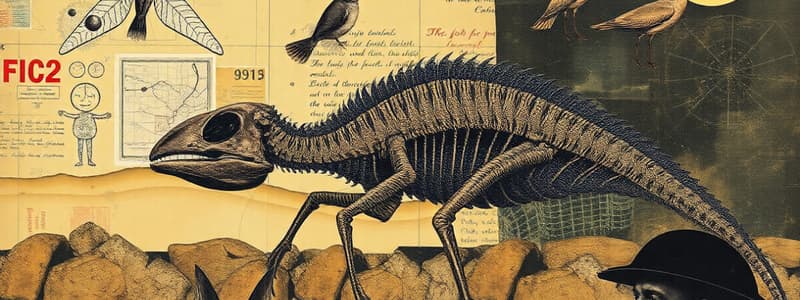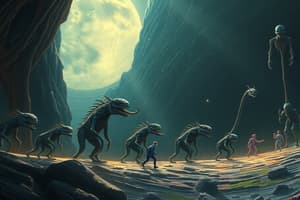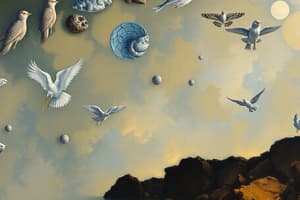Podcast
Questions and Answers
What type of cell is considered to be the common ancestor of all life?
What type of cell is considered to be the common ancestor of all life?
- Eukaryotic cell
- Anaerobic cell
- Prokaryotic cell (correct)
- Multicellular organism
Which challenge hampers the search for evidence of early life?
Which challenge hampers the search for evidence of early life?
- Lack of oxygen in the environment
- Microscopic size of cells (correct)
- High temperatures of younger rocks (correct)
- Simplicity of early life forms
The oldest microfossils currently known are approximately how many years old?
The oldest microfossils currently known are approximately how many years old?
- 3.0 billion years
- 4.0 billion years
- 4.6 billion years
- 3.5 billion years (correct)
What is a key characteristic of eukaryotic cells?
What is a key characteristic of eukaryotic cells?
Which substance is sought by researchers to identify eukaryotic cells?
Which substance is sought by researchers to identify eukaryotic cells?
What major environmental factors influenced the evolution of life on Earth?
What major environmental factors influenced the evolution of life on Earth?
What is the significance of stromatolites in early life research?
What is the significance of stromatolites in early life research?
Which group is considered the first eukaryotes?
Which group is considered the first eukaryotes?
How long did it take for life to evolve from simple single-celled organisms to complex forms?
How long did it take for life to evolve from simple single-celled organisms to complex forms?
Why are most rocks older than 4 billion years destroyed?
Why are most rocks older than 4 billion years destroyed?
Flashcards are hidden until you start studying
Study Notes
Age of the Universe and Life on Earth
- The universe is approximately 4.6 billion years old.
- Life on Earth began around 3.5 to 4.0 billion years ago.
Evidence of Early Life
- Fossil records indicate the emergence of diverse life forms.
- The common ancestor of all life was a prokaryotic organism, likely anaerobic due to early Earth's oxygen scarcity.
Challenges in Finding Early Life Evidence
- Cells are microscopic, hindering fossilization processes.
- Tectonic plate movements have destroyed rocks older than 4 billion years.
- Younger rocks often undergo heat and geological changes that erase biological traces.
Oldest Microfossils
- The oldest known cell microfossils are 3.5 billion years old, found in Western Australia.
- These microfossils are filament-like structures resembling modern photosynthetic bacteria and are related to ancient stromatolites.
Eukaryotic Cells and Biomarkers
- Biomarkers are substances unique to specific cell types, aiding in the search for eukaryotic evidence.
- Eukaryotes are defined by having true nuclei, while prokaryotes contain DNA in the cytoplasm.
Evolution of Life
- The first eukaryotes were protists, evolving from simple prokaryotic cells.
- Evolution from single-celled organisms to complex species involved considerable time and ecological changes.
- Environmental changes influenced life on Earth, linked to climate and geological shifts, fostering biodiversity.
Studying That Suits You
Use AI to generate personalized quizzes and flashcards to suit your learning preferences.




